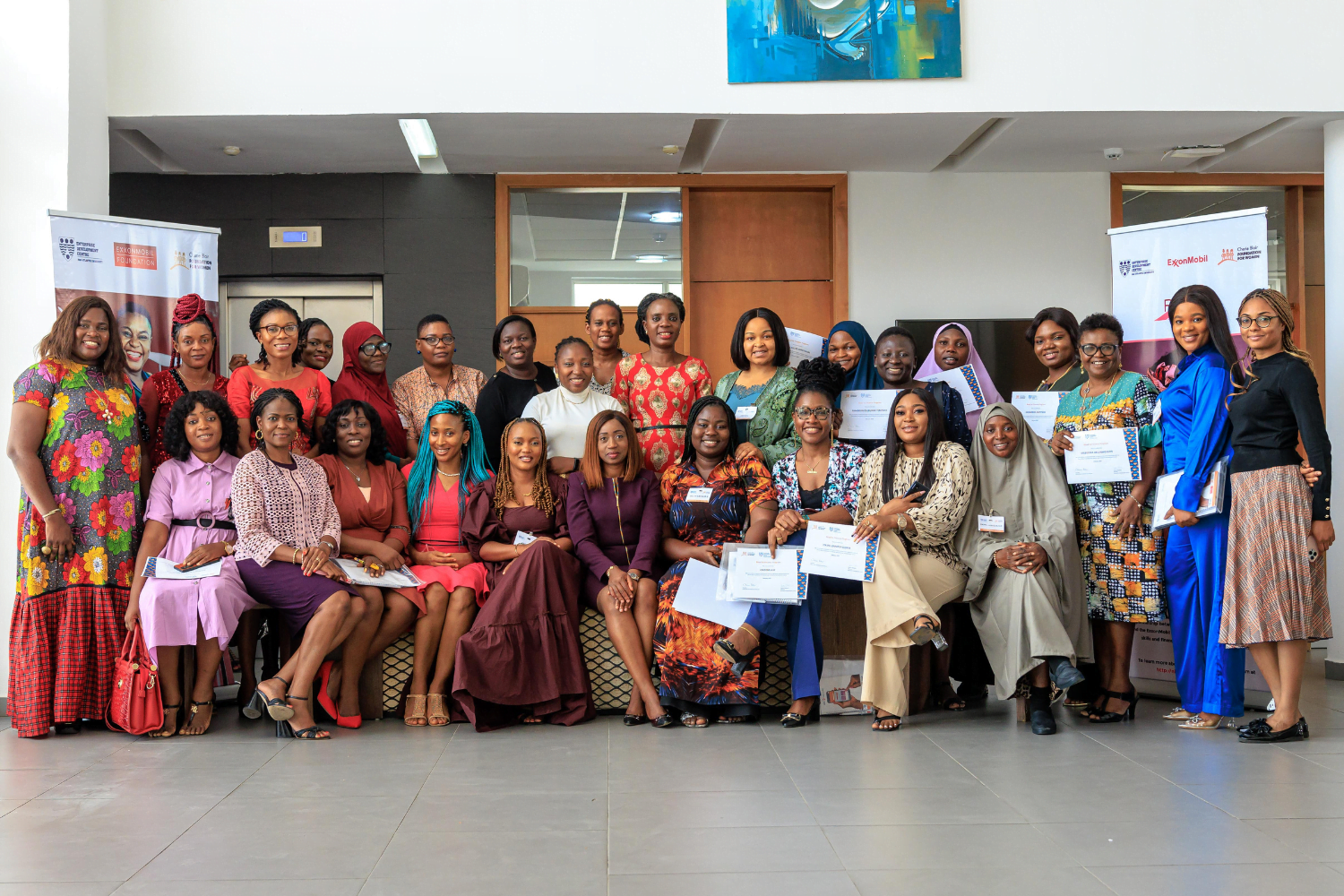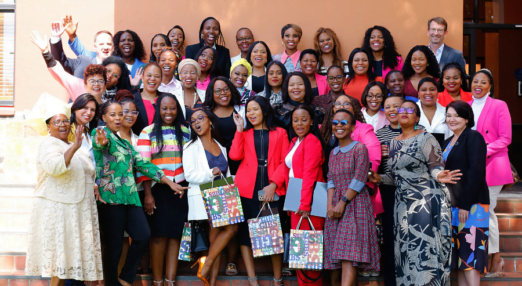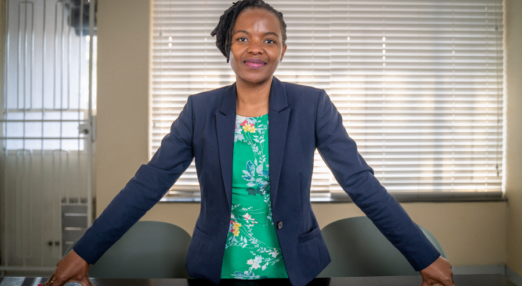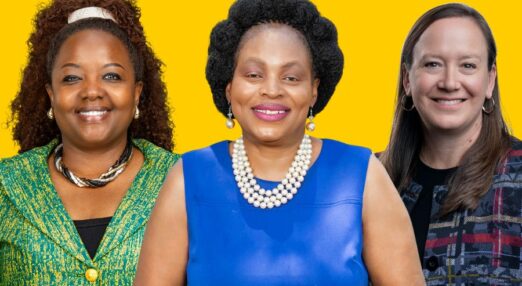On the Road to Finance
Senior Programme Manager, Leanne Baker, shares why we started the Road to Finance programme.

A year after launching our Road to Finance programme, we’ve seen great results from programme participants. Here, our Senior Programme Manager, Leanne Baker, gives an inside look at why we started the programme and the impact it’s had so far.
Globally, women-led start-ups receive less than 3% of venture capital funding, and only 2-10% of commercial bank finance goes to women-owned businesses. In 2022, the Cherie Blair Foundation for Women piloted our brand new Road to Finance training programme in Nigeria and Guyana. We developed Road to Finance in response to women entrepreneurs telling us that accessing finance was one of their greatest challenges, with over a third (36%) of those we surveyed in 2020 reporting it as their main challenge.
Only 16% said they had secured an investment or a loan from banks, while just 6% had been able to access a business loan from a financial services company. Not being able to access loans or investment restricts how much a woman can grow her business and therefore limits the potential of women entrepreneurs to thrive.
Not being able to access loans or investment restricts how much a woman can grow her business and therefore limits the potential of women entrepreneurs to thrive.
There are many intersecting reasons as to why women are less able to access finance. Worldwide, many decision-makers hold assumptions that women are not good entrepreneurs or a good investment, or that they are not as innovative as male entrepreneurs, which means that they are less inclined to invest in women. Women also frequently experience gender bias from their families: they may be told they should focus on being a wife and mother instead of business, that they should not be in control of finances, or even that their business is just a hobby which doesn’t need to grow. This undermines women’s confidence and self-belief, and means they are less likely to be taught financial literacy compared to their male counterparts – all preventing them from applying for finance.
Some discrimination is more subtle. In many countries – including Guyana, where we launched Road to Finance, and where loans are the dominant form of financing – most financial institutions require collateral to secure a loan. In practice, because of entrenched societal gender roles many women are unable to provide this collateral compared to men, and so for these loans are not an option. Many banks do not recognise and respond to this as a systemic problem: in fact, in our market assessment in Guyana 2021, the four major financial institutions we interviewed said they did not have products designed specifically for women.

The systemic challenges that women face can stack up to create an enormous barrier to accessing finance. Gender bias, stereotypes and discrimination – which many women entrepreneurs encounter every day – on top of financing terms that seem unreachable and lack of financial literacy and confidence mean that many women rule themselves out of financing by not even applying.
At the Cherie Blair Foundation for Women, we know that when women entrepreneurs are supported to build knowledge, skills, confidence and networks, they can build highly successful businesses, become better off, more independent and secure, and support their families and their communities.
In 2021 and 2022, working closely with our partners, Enterprise Development Centre (EDC) in Nigeria and ActionINVEST Caribbean Inc. in Guyana, as well as gleaning insights from women entrepreneurs and women’s economic justice specialists, we designed a four-week, blended learning programme to give women the knowledge, skills and confidence to secure investment and take their businesses to the next level. Through the Road to Finance programme, participants learn how to assess their business’ financial and strategic position, the financial options available to them, how to negotiate financing terms and how to develop a pitch.
Through the Road to Finance programme, participants learn how to assess their business’ financial and strategic position, the financial options available to them, how to negotiate financing terms and how to develop a pitch.
The programme culminates in a pitching event, where participants have an opportunity to practice their pitches for investment in front of their peers and a panel of judges, who are representatives from financial institutions and the business community. The judges provide feedback to help the participants improve their pitches for future opportunities.
This is a very popular part of the programme with participants, and we’ve heard from the judges that this experience is also enjoyable and insightful for them, with several returning to judge again. Seeing so many hardworking, aspirational women deliver their pitches prompts them to reflect on the particular barriers women entrepreneurs face, and challenges the gender biases they may hold. In this way our programme is also able to challenge biases baked into the system.
We saw strong outcomes from those who participated in Road to Finance pilot in Nigeria and Guyana in May 2022:
- 62% had had conversations with financial institutions or investors within six months after the programme.
- 36% had already applied for a loan or investment and 62% of these said the programme had directly helped them with this process. Of these, at the time of asking, 29% had been successful and 45% were still waiting to hear.
- A further 43% were planning to apply for a loan or investment.
- Every single participant agreed that the programme supported them with the knowledge and skills needed to make important financial decisions.

We have since had another cohort of participants in both Nigeria and Guyana. Given our knowledge that many factors contribute to women entrepreneurs lacking confidence to try to access finance, we are particularly pleased to see that 87% of our second Guyana cohort and 100% of our second Nigeria cohort reported that their confidence to apply for a loan or investment had increased.
As with all of our work, we continue to learn and to adapt the programme to ensure that it continues to meet the needs of the women in each country we work in. We are excited to have a further 50 women taking part in Guyana this September, and hope to be able to take Road to Finance to women entrepreneurs in other countries soon. We also hope to engage more financial institutions and investors, and to continue to grow and design ways to enable women to access what they need to grow their businesses and achieve their potential.
Read more news...
-

We’re supporting 45,000 women across Sub-Saharan Africa with DHL Express
Through our renewed multi-year partnership with DHL Express, we'll expand our reach and deepen our impact.
Read more
-

Building confidence: A key to women’s business success
Confidence is crucial for women entrepreneurs' business journeys. Our Senior Manager - Evidence and Learning, Rachel Seftel, explains.
Read more
-

Announcing our new trustees
We are delighted to welcome Suzanne Ehlers, Francesca Nxedhlana and Winnie Wambugu to our Board of Trustees.
Read more
